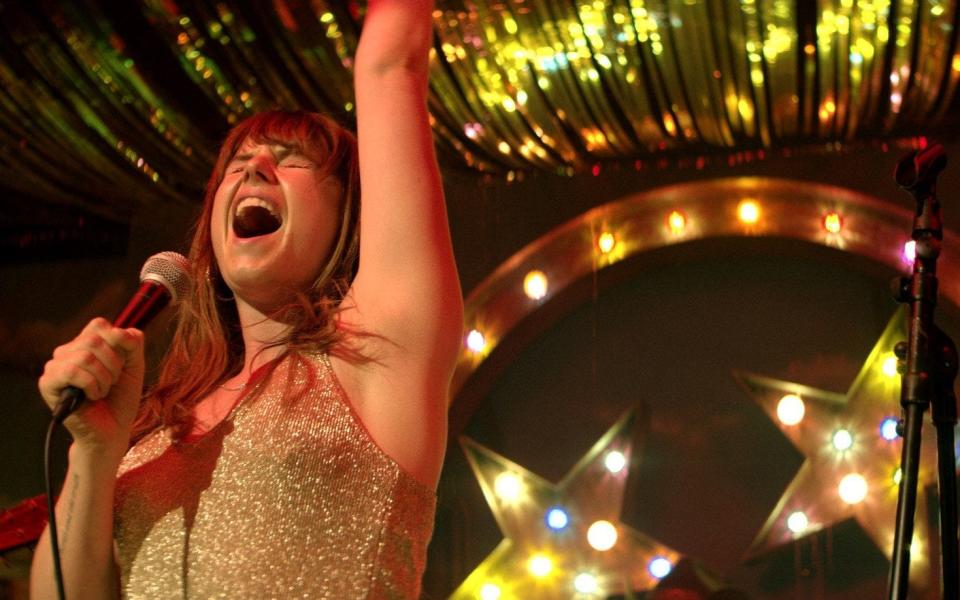Wild Rose review: Nashville meets Glasgow, and in Jessie Buckley a star is born

Dir: Tom Harper. Cast: Jessie Buckley, Julie Walters, Sophie Okonedo, Jamie Sives, James Harkness, Ashley Shelton. 15 cert, 100 min
Stars aren’t born like Jessie Buckley every day. If the foot-stomping country music drama Wild Rose were a talent show, she’d blaze over every hurdle to win it. In fact, since she was pipped in the final of the BBC’s I’d Do Anything in 2008, this has to count as coming back with a vengeance. She has grit, enormous charm, a kind of chin-up defiance, and a combination of acting and singing expertise in which neither side of the equation lags behind.
Buckley was excellent in 2017’s Beast, playing a troubled bystander in a murder mystery, and she latches onto this new role with throaty gusto. As Rose-Lynn Harlan, a recent parolee itching to follow her dreams all the way to Nashville, she has a heap of baggage tied to her like an anchor, not least two children, a school-age daughter and son whom she clearly wishes she hadn’t had so young. As the film begins, she comes ebulliently back into their lives, following a year served inside for drunkenly throwing some heroin over a prison fence.
Their grandmother Marion (Julie Walters), who works in a Glasgow bakery, has taken on the hard graft of bringing up these two with a simmering sense of grievance, and continues to do so as Rose-Lynn plots her escape, pursuing every avenue she can to get back on stage. Not many options abound: she’s persona non grata in Glasgow’s Grand Ole Opry, and has an electronic ankle monitor that keeps her under evening curfew, making gigs impossible.
For money, she gets a cleaning job, and her employer turns out to be something of a guardian angel. This is Susannah, a moneyed mother-of-two played by Sophie Okonedo, who has exactly the wherewithal (and BBC contacts) that Rose-Lynn might need to get noticed.
The problem is her own impetuous nature. Minutes after being left alone in Susannah’s house, she’s raiding the cocktail cabinet to hoover while half-cut, yawling out country standards with her headphones on. The sequence is exuberant and tense at the same time: what if she’s caught? And while there’s mounting excitement about finally getting her career off the ground, she can’t level with this eager new patron about her past, or even the existence of her kids.
Okonedo is lovely, rendering Susannah well-meaning to a fault without stinting on her natural warmth. And Walters, lately on something of a roll, lends more than just reliable substance to her part. Marion is stony, stressed, hard to please, which we get even from the rigid way in which she brings food to the table. But she’s waiting to be not-disappointed by her daughter, and for her own maternal instincts to show some sign of being transmitted. Doing all the film’s hard labour, she creates a credible workhorse of a character with a fairly peerless lack of ostentation.
Directed with vim by Tom Harper, Wild Rose is a serious crowd-pleaser all right, but what’s so refreshing about it is the way it refuses emotional shortcuts – it doesn’t cheat, rarely sentimentalises. Nicole Taylor’s debut film script is a clever feat of construction, coaxing us elegantly, near-invisibly, around all this story’s necessary bends and handbrake turns.
There’s a very funny scene trying to appeal Rose-Lynn’s parole terms; “Your lordship, a more contrite young lady it would hard be find…” declaims her solicitor, a Pinocchio nose almost visibly growing out of his face. And then Rose-Lynn – in one of Taylor’s best little touches – drags the same man into the Ole Opry for celebrations, clambering up for an impromptu (and thoroughly apropos) rendition of Chris Stapleton’s Outlaw State of Mind.

Finally, it’s the marrying of Rose-Lynn’s country ethos with her own struggle – as far removed as Glasgow might seem from snakeskin and cowboy hats – that makes everything click into place. The film maintains a careful tension about what following your dreams might entail: some dreams, like Dorothy’s journey to Oz, only wind up confirming what matters most at home.
The film really comes up trumps at the very end, saving its two best songs for last, and the two which relate best to Rose-Lynn. The huge contrast in how Buckley sings them – and who’s listening – sums up the film’s themes irresistibly, with even a Yellow Brick Road reference smartly embedded in the lyrics.
Landing the perfect ending is a challenge for any such story; A Star is Born, for all its guts and pathos, peaked early. Wild Rose holds its horses, and lets Rose-Lynn soar only when she’s worked out who she is.

